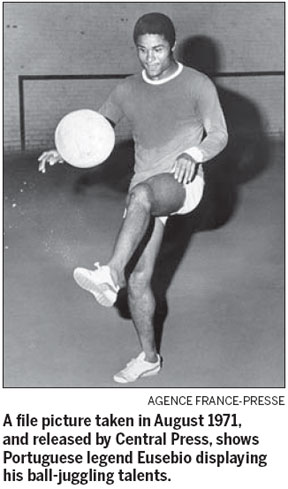

The 'Black Panther' leaves behind a brilliant soccer legacy which will never be forgotten in his adopted homeland
A half century later, Eusebio's goals are still a source of wonder in the country where he stood above all others in his sport.
There was the European Cup final against Real Madrid in 1962, when he scored the last two goals to rally Benfica to a 5-3 victory and its second straight continental title.
There was the 1966 World Cup quarterfinal against the Democratic People's Republic of Korea. With Portugal trailing 3-0, Eusebio inspired his team, striking four goals which led to a 5-3 victory.
Eusebio da Silva Ferreira, who was born into poverty in Africa and became one of the world's top scorers during the 1960s, died Sunday at 71.
He died at his Lisbon home of heart failure, his biographer, Jose Malheiro, said. Eusebio was admitted to the hospital several times over the past year with heart and respiratory problems.
"A football genius and example of humility, an outstanding athlete and generous man, Eusebio was for all sports fans and for all Portuguese an example of professionalism, determination and devotion to the colors of the national jersey and of Benfica," Portuguese Prime Minister Pedro Passos Coelho said in a statement.
Known affectionately as the 'Black Panther' for his athleticism and finishing touch, Eusebio was voted one of the 10 best players in soccer history.
The Portuguese government declared three days of national mourning, with flags at half-staff. The Portuguese Football Federation ordered a minute's silence before Sunday's Portuguese Cup games.
Portuguese President Anibal Cavaco Silva made a nationally-televised address to the nation to praise the "affability and humility" of a man who never let stardom go to his head.
"His talent brought joy for entire generations, even those who didn't live through the most glorious moments of his career," Cavaco Silva said.
Eusebio's biggest accomplishment may have been his play in leading Portugal to third place at the 1966 World Cup. But his agility and speed made him one of Europe's most dangerous forwards for most of a career that lasted two decades.
He was awarded the Ballon d'Or in 1965 as Europe's player of the year and twice won the Golden Boot - in 1968 and 1973 - for being top scorer in Europe. According to soccer's governing body, he had 679 goals in 678 official games.

At the 1966 World Cup, where Portugal lost in the semifinals to host and eventual champion England, Eusebio became even more popular at home when he wept openly as he left the field following the defeat.
He finished as the tournament's top scorer with nine goals. In 1998, a panel of 100 experts assembled by FIFA named him in its International Football Hall of Fame as one of the sport's top 10 all-time greats.
"Look, there are only two black people on the list: me and Pele," Eusebio said, referring to the Brazilian great who was a friend. "I regard that as a great responsibility because I am representing Africa and Portugal, my second homeland."
Eusebio was born in Maputo, the Mozambican capital, during World War II when the southeast African country was still a Portuguese colony. He came from a poor family but sparkled for his local team and was lured by Benfica to Portugal when he was 18.
His unpretentious and easy manner was complemented by his heart and skills. His popularity in Portugal was such that in 1964, when Italian clubs offered to buy Eusebio for sums that were astronomical for the time, the country's then-dictator, Antonio Salazar, decreed the player a "national treasure" - meaning he could not be sold abroad.
Eusebio was a cornerstone of the Benfica team that won back-to-back European titles in the early 1960s. With Benfica, he won 11 Portuguese league titles and five Portuguese Cups.
In the 1966 World Cup quarterfinal in Liverpool, Portugal got off to a dreadful start and was three goals down after 23 minutes.
"We were taken completely by surprise," Eusebio told The Associated Press at the 2010 World Cup in South Africa, where the Portuguese had a second meeting with the DPRK, 44 years after the first.
"I remember very clearly what (teammate Antonio) Simoes said when we were 3-0 down. He kept saying, 'as long as we don't go four goals down, we're still in with a chance,'" Eusebio said. "And he was right."
Eusebio led Portugal's astonishing comeback by repeatedly charging at the DPRK defense, scoring four goals in just more than 30 minutes.
After his first two goals, he picked the ball out of the net, ran back to midfield and placed the ball on the center spot for the restart. He completed his hat trick in the 56th minute, evening the score. His fourth goal came on a penalty kick as the DPRK's defense collapsed amid the onslaught.
"That was the best game of my life in a Portugal jersey," Eusebio said. "It left its mark on me."
(China Daily 01/07/2014 page24)